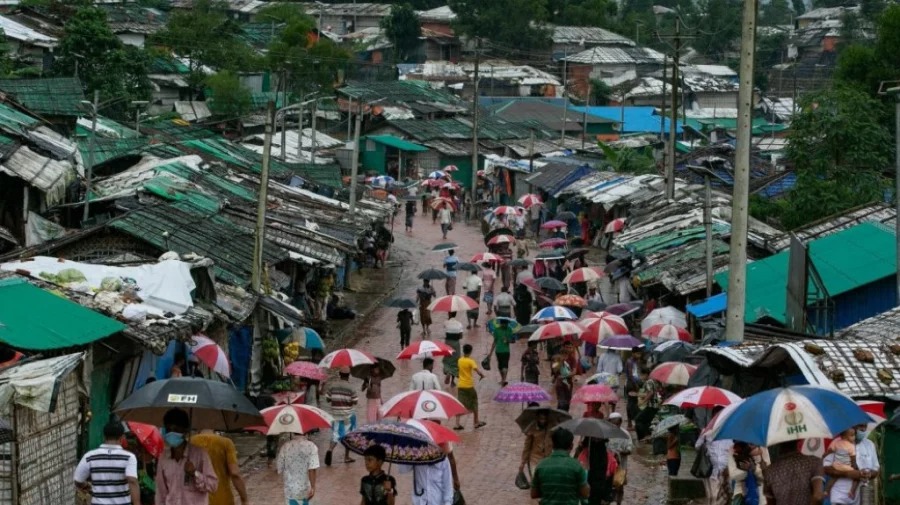A brief history of the Rohingya and their ordeals since 1784

![]()
News Desk
In 2020, the ICJ orders Myanmar to take urgent measures to protect the Rohingya remaining inside Myanmar
August 25, 2023 marks the sixth anniversary of the Rohingya exodus. Fleeing military-led atrocities in Myanmar, over a million Rohingya have taken shelter in Bangladesh.
For the more than 1.1 million Rohingya refugees in Bangladesh, the day is observed as Genocide Day.
This is a timeline of two centuries of Rohingya history until the 2017 atrocities.
1784: King Bodawpaya invades the Kingdom of Arakan, the polity to which the Rohingya trace their history.
1824–1886: Britain invades Myanmar multiple times resulting in three wars.
1886–1942: Myanmar becomes a province of British India and is later separated into a British colony.
1942–1945: Japan invades Myanmar during World War II. Rohingya Muslims fight alongside the British, while Rakhine Buddhists side with the Japanese. Tens of thousands of people flee the violence to Bangladesh.
1945: Japan is defeated.
1947: An agreement is signed to guarantee Myanmar’s independence within a year. Rohingya are elected as members of Myanmar’s governing body.
1948: New Myanmar parliament recognizes all citizens as equal.
1949: National identification starts through registration cards to all citizens, including the Rohingya.
1951–1960: Myanmar holds three general elections and several Rohingya leaders are elected.
1962: Military rule starts.
1974: Authorities begin confiscating Rohingya national registration cards.
1978: Operation ‘Dragon King’ is launched to register and verify the status of citizens. Soldiers assault and terrorize the Rohingya.
1982: Citizenship law is passed excluding the Rohingya.
1988: Pro-democracy protests flourish throughout Myanmar, leading to a brutal military crackdown.
1989: All citizens—except Rohingya—are told to avail new identification cards.
1991: Operation ‘Clean and Beautiful Nation’ starts, forcing roughly 250,000 Rohingya to flee to Bangladesh.
1991–1992: NaSaKa is formed to persecute the Rohingya.
1992: Roughly 150,000 Rohingya in Bangladesh return to Myanmar.
1994: Birth certificates no longer issued to Rohingya children.
1995: Rohingya get temporary registration cards.
2008: Myanmar constitution is revised.
2012: Clashes between the Buddhist and Muslim communities in Rakhine state erupt into state-supported violence against Rohingya. Buddhist nationalist movement, “The 969,” is formed.
2012–2014: Tens of thousands of Rohingya flee Myanmar by boat due to escalating persecution.
2014: Ultra-nationalist monks create anti-Rohingya movement, MaBaTha. A national census is conducted excluding Rohingya.
2015: Rohingya white cards are invalidated and they get national verification cards as Bangladeshi immigrants. Rohingya deprived of voting rights.
2016: Rohingya men attack several police posts in Rakhine state, killing nine officers.
A military crackdown starts, killing many people, raping women, and destroying Rohingya villages, causing roughly 86,000 Rohingya to flee to Bangladesh.
2017: In March, the UN fact-finding mission is created to investigate human rights abuses. Myanmar refuses to cooperate.
In August, Rohingya exodus begins as atrocities start following attacks by ARSA on military posts in Rakhine. At least 6,700 Rohingya, including children, are killed in a month.
Nearly 740,000 Rohingya refugees flee to Bangladesh in the first three months of the crisis.
2018: UN investigators accused Myanmar’s military of carrying out mass killings and rapes. Bangladesh and Myanmar sign a Rohingya repatriation deal. First repatriation attempt fails.
Second repatriation attempt goes in vain. Gambia files a genocide case against Myanmar at the International Court of Justice (ICJ).
At the 73rd United Nations General Assembly, Prime Minister Sheikh Hasina says there are 1.1 million Rohingya refugees now in Bangladesh.
2020: The ICJ orders Myanmar to take urgent measures to protect the Rohingya remaining inside Myanmar. And, Myanmar’s army says it will court-martial soldiers. UN envoy to Myanmar says Myanmar is committing war crimes in Rakhine.
Rohingya relocation to Bhashan Char begins.
2021: Massive fire and flash flood kills 13 Rohingya, displacing thousands of others. At least 12 die and 15 others go missing after a boat carrying Rohingya tries to flee Bhashan Char.
Dhaka rejects World Bank proposal on integrating Rohingya into Bangladesh.
Covid vaccination of Rohingya starts.